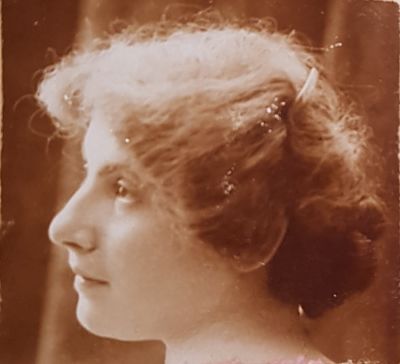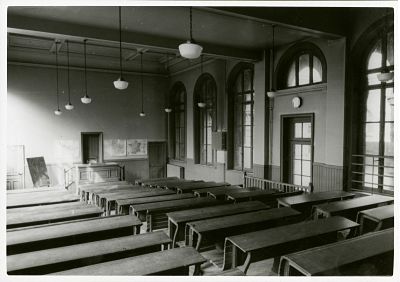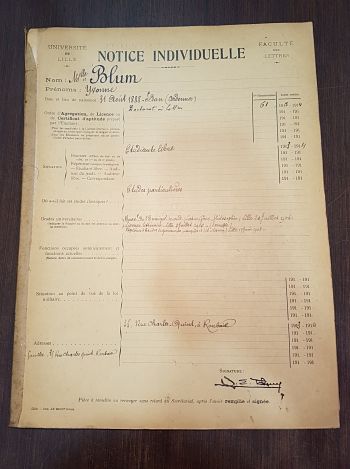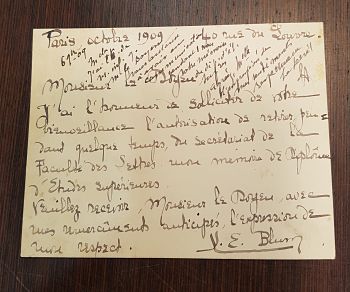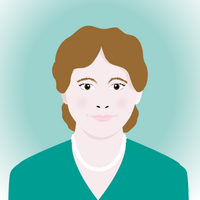
Yvonne Blum was born in Sedan in the Ardennes on 31 August 1888. She was the daughter of Émile Blum, a drapery merchant, and Dina Klein. Nothing is known about Yvonne Blum’s childhood, and information is scarce. But it seems from her birth certificate that her mother’s family was also involved in the textile industry. It was probably for professional reasons that her family moved to Roubaix, to 35 rue Charles Quint.
First female student to graduate from the Faculty of Arts
Yvonne Blum obtained her baccalauréat in 1905, followed by a literary bachelor’s degree in German from the Lille Faculty of Arts in 1906. She was the first woman in the Faculty to be awarded this degree, making her a pioneer of the Faculty. In 1907, she obtained a postgraduate degree (diplôme d’étude supérieure; DES) in classical language and literature. Yvonne Blum went on to pass the agrégation competitive teaching exam in the humanities (1910), and then chose to study for a doctorat d’Etat en Lettres doctoral degree. She continued this project until 1914. At the start of the 1914 academic year, Yvonne Blum was no longer enrolled at the Faculty. France had since entered the war and the Nord region was occupied by the enemy.
Exile in Paris and marriage
We track her down in Paris a little later together with her family. Did Yvonne Blum flee the invasion with her family, or was she one of the northerners evacuated by the Germans to France as useless mouths to feed? From then on, the Blum family lived in the sixteenth arrondissement on rue Gustave Zédé. In Paris, Yvonne Blum supported the war effort by choosing to become a nurse. Perhaps this is how she met Jules Bloch, a lecturer at the École Pratique des Hautes Études. Yvonne Blum was 28 years old. Born in Paris in 1880, Jules Bloch held a Bachelor of Arts degree, a degree from the École Pratique des Hautes Études, a degree from the École des Langues Orientales, a doctorate in the humanities, and had passed the agrégation competitive teaching exam for grammar. A brilliant career lay open to him. But Jules Bloch, like many other young men his age, was serving in the army. He was a second lieutenant in the 220th Infantry Regiment and had already been awarded the Croix de Guerre for his bravery at the front. The young couple married on 4 November 1916, in the presence of Roubaix mayor Jean-Baptiste Lebas, who had recently been released by the Germans. This favour was probably due to Émile Blum’s connections. After the wedding came a time of anticipation and anxiety, all the more so as the birth of their first child was on the horizon. Jules Bloch was described as ‘an officer of very high morale’ and courage. He was she was given an honourable mention in the ‘ordre de l’armée’ in October 1916: ‘On 6 September, showing no regard for danger, he brilliantly led his section in an assault, took command of the company in extremely difficult circumstances, and withstood several counter-attacks. An officer of extraordinary courage and composure.’
Fortunately, he came back from the war alive. It seems that Yvonne Blum decided not to pursue a profession after her studies or to finish her doctorate. Between 1917 and 1925, she gave birth to four children: Alain, Denis, Brigitte and Vincent. She had the misfortune of losing her eldest son in 1928. Her husband pursued a prestigious career as director of studies at the École Pratique des Études, the Collège de France, the Ecole des Langues Orientales and the Faculté des Lettres de Paris. In 1920, he became assistant secretary of the Linguistics Society. Vincent Bloch would later recall that his childhood was ‘a happy one with exceptional parents who had countless remarkable friends’. Yet the shadow of fascism hung over this happy family. Jules Bloch was one of the signatories of the ‘Appeal of the Vigilance Committee of Anti-Fascist Intellectuals’. The invasion of 1940 put an end to this happy period. For Yvonne’s son Vincent, 1940 marked the end of his childhood.
World War II
Yvonne Blum and Jules Bloch raised their children in ‘a pacifist tradition linked to a patriotic cult with military connotations’. Faced with the advance of the Germans, the family, like many French citizens, decided to leave.But after the armistice, they were forced to return to Paris, no doubt worried about their fate. In 1940, their son Denis left and joined the Free French Forces, reaching London via Spain. Like everyone else, they soon experienced the horrors of hunger and cold during rationing. The family lived close to the Renault factories, in fear of Allied bombing raids. The fear of roundups was soon added to this. As the family was Jewish, Jules Bloch had been relieved of his duties and could no longer teach. Vincent Bloch recalled being subjected to a few anti-Semitic insults. In May 1942, the Feldgendarmerie arrived to arrest Jules and a neighbour. Thanks to his daughter Brigitte, who delayed the police, Jules and his son Vincent had time to escape. The next day, the Gestapo visited the family home. The family had to disperse and flee to the Free Zone. They met up again in Castres before moving on to Lyon, where Jules found a position at the Faculty of Arts. Meanwhile, Vincent tried to continue his studies in Toulouse while using false papers to escape the Compulsory Work Service (Service du Travail Obligatoire; STO). He joined the Resistance and then the Maquis. He took part in parachute drops of Allied weapons and officers, as well as attacks on German convoys. We can imagine the anxiety of his mother, no doubt unaware of his activities, but separated from him and fearful of learning of his arrest at any moment. Upon the Liberation, he joined the army, which took him all the way to Germany.
The post-war period
At the end of the war, Yvonne Blum and her family returned to Paris. Jules Bloch retired in 1951 and died in 1953. Yvonne also died in 1967 in Sèvres.
Her son Vincent became a psychophysiology teacher. He worked at Lille’s Faculty of Science from 1963 to 1972, and became head of the biology department (1968) shortly before the events that led to major changes in universities, including the creation of the University of Lille 1. In his autobiography, he stresses that he has fond memories of his time in Lille. During his time there, he worked to bring together biology and psychology, which he wanted to see join the Cité Scientifique campus, but this project never came to fruition.
Once her university career was over and her family life had begun, no direct trace of Yvonne Blum can be found in the archives. It was through her husband’s career and her son’s biography that we were able to retrace her path from university to the shadow of the men in her life.
Notes written by Sarah Lagache.
Sources
Bibliography
Condette (J-F), La Faculté des Lettres de Lille de 1887 à 1914 : métamorphoses d’une institution universitaire française,villeneuve d’Ascq, Presse universitaire du Septentrion, 1999.
Parot (Fr.) and Richelle (M.), Psychologues de langue française,presse universitaire de France, 1992.
Archives
Student file 2640W 28 Nord Department Archives
Birth certificate 2 E 209 34 AD 08 Ardennes Department Archives
Marriage certificate 16M201 Nord Department Archives
Jules Bloch military record D4R1 1083 Paris Archives
Online sources
Annual report of the Dean of the Faculty of Arts, Annals of the University of Lille, Nordnum.fr
Jules Bloch biographical note on Persée.fr
Pierre Delorme and Jean-Marie Coquery, ‘La physiologie animale & la psychophysiologie à la Faculté des Sciences de Lille de 1958 à 1970’, Histoire de la Faculté des Sciences de Lille et de l’Université Lille 1 Sciences et Technologies, vol. 7, Association de solidarité des anciens personnels de l’Université de Lille.

